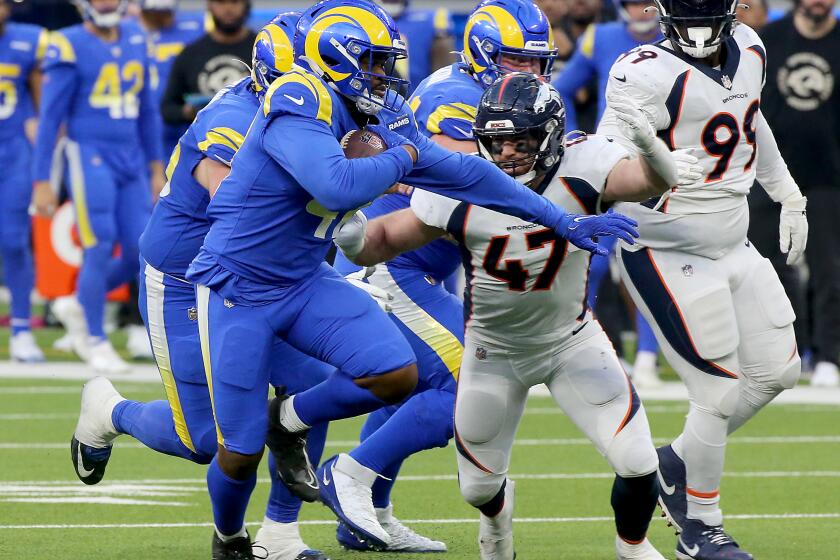The Big 3 Networks Rediscover the News : Television: NBC’s addition of ‘Saturday Today’ will bond affiliates with an existing money-maker. And all networks are trying overnight news to combat CNN.
The NBC announcement is an eye-popper as it discusses the network’s plans:
“As part of its increased commitment to news and information programming . . . .”
Whoa!
This is the network that, like CBS, has been laying waste to its news division for several years now, closing bureaus and firing staffers. In this week marking today’s 50th anniversary of the attack on Pearl Harbor, NBC is the only network that failed to commemorate the event with a prime-time news special. Instead, it reran a 13-year-old, soap-opera-ish miniseries about the outbreak of the war, “Pearl.”
NBC isn’t even in the running against such prime-time magazines as CBS’ “60 Minutes” and ABC’s “20/20.”
But wait. That Thursday announcement offered a ray of hope as it disclosed NBC’s plan to expand its morning “Today” show to seven days a week, adding a Saturday edition.
There is nothing noble about the plan--especially since “Saturday Today,” which debuts in August, will kill off several hours of NBC’s children’s cartoons, which are more expensive to produce.
Nonetheless, the upside of the move is that NBC and its owner, General Electric, have bowed to the single most important fact about a news division: It defines and protects the image of an entire network, especially when it is in trouble.
With its children’s cartoons trailing in the ratings and its stations getting edgy--and breaking away--NBC went straight to its historic morning news series as the strongly identifiable force that would be a bonding image for its affiliates.
The admission of NBC President Robert Wright on Thursday that the network will lose between $60 million and $70 million this year indicates the severe plight of the broadcast company.
John Miller, head of NBC’s daytime programming, says the logic behind the “Today” expansion is that the series is a moneymaker, and extending it to Saturdays “is not like a whole new news-gathering thing has to be put in place. We don’t have to reinvent the wheel. It’s something we know how to do.”
All of the networks, in fact, are suddenly using news to redefine themselves--and bond with their stations--in the unlikely area of overnight programming, where CNN has wooed away not only viewers but affiliates of ABC, CBS and NBC by offering them reports to fill the wee hours.
NBC was the first to launch its insomniac news reports--Nov. 4--with a plain-wrap series of roundups called “Nightside” from Charlotte, N.C. It is no accident that NBC, under GE, chose the right-to-work state of North Carolina as the headquarters of this no-frills broadcast service for affiliate stations. The cutback on union labor is clearly part of NBC’s long-term plan to operate on the cheap, and “Nightside” looks like amateur night in Dixie.
Nonetheless, network penetration is still formidable, even in these low viewing hours, and Miller says that “Nightside,” in just a month on the air, “is already beating CNN” in the ratings. In production quality, however, CNN wins hands down.
ABC also has plans for an overnight news service--”World News Now,” which debuts Jan. 6. And just this week, CBS announced that it is killing off its decade-old overnight interview series, “Nightwatch,” and replacing it in late February or March with straight news broadcasts that will be available to its stations from 2 a.m. to 6 a.m.
The question, of course, is: Who in the world needs so much news of the same type at the same hour? How many TV anchors can you take in a day? How many clips of the same story?
CBS’ decision to drop “Nightwatch,” which will enable the network to lay off even more staffers, is not only regrettable but just plain stupid. It was begun in the first place, in 1982, to help counter the overnight lure of the then fledgling CNN operation. And it has been a real alternative to other news programming for late-night viewers, especially at its high point when Charlie Rose was the host.
As for the sudden overnight move of all the networks against CNN, the fact that it took them 10 years to act against the aggressive cable competitor to hold their stations and viewers tells you a lot about why they are in trouble today.
What we have now, in effect, is all of the Big Three trying to act like CNN--attempting to get the most out of a lean operation as they battle to stay alive. But is there an audience for three overnight network newscasts?
“No,” says Joel Segal of the McCann-Erickson advertising agency. “But production cost is very low. It’s probably an anti-competitive device and for station relationships.”
Betsy Frank of the Saatchi & Saatchi ad agency has another view: “Viewers no longer make an appointment to watch the news at 7 p.m. because there are so many alternatives available, so it’s a question of networks getting a piece of that action.”
The overnight news burst “is amazing,” says Paul Bricault, an analyst with Paul Kagan Associates, a media research firm. “But news is certainly cost-effective programming.”
Miller puts it plainly: “A lot of our stations have bought supplementary news services to fill their desires. Our desire is to fill their needs and cement our partnerships.”
Industry experts generally think NBC is making a wise move in introducing “Saturday Today”--which will be launched during the network’s coverage of the Summer Olympics in Barcelona, Spain. Miller says at least four NBC stations--in Seattle, San Francisco, Sacramento and Pittsburgh--have already switched to similar Saturday-morning shows of their own with success.
The belief is that viewers generally have more leisure time to spend with the news on Saturday mornings--the show will be seen from 7 to 9 a.m. locally. In addition, with more two-income families, there is also the belief that a Saturday morning TV news show would be welcomed by weekend workers who want a briefing before leaving home.
“CNN does very well on Saturday morning,” Segal says. “NBC stands a better chance of making a profit with news. It’s cheaper, less risky, more reliable. The children’s market is highly competitive with the three networks, Fox, Disney and cable.”
“NBC’s profits have dropped 60% on Saturday morning,” Bricault says. “An average half-hour animated show costs $350,000. Given that NBC is already producing a ‘Today’ show, there are some obvious synergies. If you already have news, it’s easier to amortize the cost.”
Says Miller: “Stations with a vested interest in news have been pressing us to get away from kids and into a known franchise.”
News. The defining network image.
More to Read
The biggest entertainment stories
Get our big stories about Hollywood, film, television, music, arts, culture and more right in your inbox as soon as they publish.
You may occasionally receive promotional content from the Los Angeles Times.






